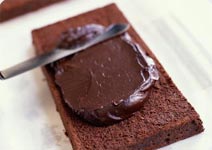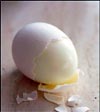| |
Today
we see a common problem among children of them wanting to eat chocolates
and sweets most of the time or a tendency to eat large amounts of
rice, bread, etc.
Childhood is
a time of growth and the need for energy is great so the craving
for sugar and starch is understandable. However a proper balance of nutrients
namely carbohydrate and protein is very important to ensure good
growth and also prevent unhealthy eating habits from setting in
now. In such cases what we normally see is that the protein in the
diet may be quite low and hence the children get hungry and the
stomach feels empty an hour or so after a meal and they start looking
out for chocolates and sweets.
and starch is understandable. However a proper balance of nutrients
namely carbohydrate and protein is very important to ensure good
growth and also prevent unhealthy eating habits from setting in
now. In such cases what we normally see is that the protein in the
diet may be quite low and hence the children get hungry and the
stomach feels empty an hour or so after a meal and they start looking
out for chocolates and sweets.
I would like
to explain what carbohydrate and protein foods are. Carbohydrates
are sugars and starch. Sugar is found in fruits, regular sugar,
jaggery, honey, etc. Starch is found in all vegetables and cereals
- rice, wheat, corn, ragi, jowar, bajra, etc.Protein is found in
dhals, pulses, milk, milk products, egg, fish, chicken, meats, and
nuts.
The first thing to do is to check if in each meal the child is getting
both a carbohydrate as well as a protein food. Only a glass of milk
for breakfast is not balanced. Milk plus 2 slices of bread or cereal
and milk or porridge with milk would be ideal.Similarly, milk and
egg alone is not good, milk, egg and bread or chappathi would be
ideal.Bread and jam or bread and butter alone is not good as the
protein is missing. Egg or milk must go with it. Iddli and sambar
or dosa are good as they are in themselves a rice and dhal combination.
However, I would suggest a glass of milk even with idly and dosa
for breakfast. Upma must be eaten with curds or a glass of milk.
Most often lunches and dinners are also poorly balanced. Lime rice,
tamarind rice or pulav and subji or chappti and subji is again a
purely carbohydrates combination. Protein is missing, dhal, pulses,
non-veg, egg or curd must be given with the above..
 Kindly
note that raw eggs are useless in terms of protein as the white
part of the egg cannot be digested by the human body unless it is
cooked. If eaten raw the white is completely excreted from the body. Kindly
note that raw eggs are useless in terms of protein as the white
part of the egg cannot be digested by the human body unless it is
cooked. If eaten raw the white is completely excreted from the body.
We have also seen that in many cases dhals and pulses are given
very little importance. Dhals and pulses are very good source of
protein as well as vitamins and minerals.They should be a part of
the daily menu in the form of dhals, sambars, and channa, rajma,
moong palyas or curries. They must be eaten at least once a day
and twice would be ideal.So ensure that your child is getting 2
– 3 glasses of milk a day, 2 servings of dhals / pulses, an
egg a day (more egg white may be eaten but only one yolk / day).
Carbohydrate foods get digested in 1-2 hours after intake. Protein
foods take 3-4 hours to be digested. If your meal contains only
carbohydrate food you will feel empty and hungry after 2 hours and
will be tempted to reach for sweets. If there is a protein food
in every meal you will feel empty only after 4 hours and close to
the next meal. This is the secret for resisting nibbling chocolates
and sweets between meals. If you do feel hungry before the meal
time, try to eat a fruit and wait for your meal.
Reduce the inflow of chocolates and sweets in to the house and teach
the child to enjoy the fruits. Veggies are a must and a fresh salad
should be included at least once a day. Try the above and keep the
bad habits at bay!!
|
|